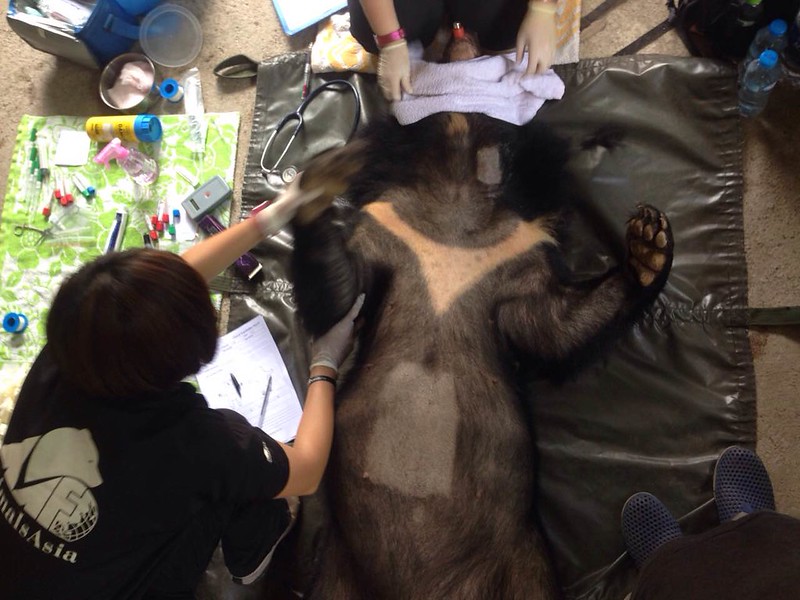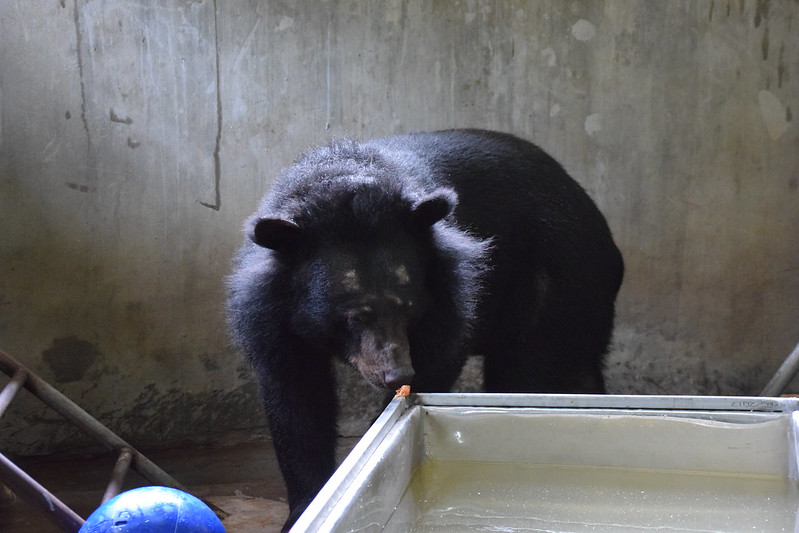Breakthrough for the nervous bear too scared to believe she was truly safe
16 October 2017
Life on a bile farm left moon bear Jane with a fear of humans and open spaces but when she stepped outside for the first time, her carers knew the dark days were over.
When rescuers first met Jane on a farm in southern Vietnam, they could see how the trauma of being locked up in a cage for years on end had taken its toll on the frightened bear.
Jane’s fur was thin and patchy. Her teeth were coated in tartar from being underfed and given only rice gruel to eat. She couldn’t stop scratching her skin, which was dry and irritated, the result of an allergy to the damp, dirty conditions she was forced to live in.
But her carers thought these ailments were nothing that could not be cured by an abundance of nutritious food and plenty of time outdoors in the sun.
What worried her rescuers more was Jane’s fearful, anxious behaviour. She was undoubtedly the most apprehensive of the nine bears rescued and taken to Animals Asia’s sanctuary to heal from a lifetime of being subjected to bile extraction, a painful and invasive practice that leaves deep physical and psychological scars.
For a long time, Jane was simply unable to relax in her new home. Rather than lying down or lounging lazily, she was often found on her feet, rubbing her head against the inside of her den, an example of the kind of repetitive behaviour that plagues animals who have suffered acute distress.
Although a large grassy enclosure with trees, bamboo climbing frames, sweet treats and an open sky was on her doorstep, Jane seemed more at ease inside her den.
But recently, Jane’s whole outlook on life changed.
In a remarkable breakthrough, Jane left her den to tentatively step onto the grass outside in pursuit of a large plastic ball.
She pawed the ball and played with it for a while, undeterred by the driving rain, before returning to her den.
It was only a few metres, but for Jane the mental gap she stepped across was vast.
Bear Manager Sarah van Herpt said: “I’ve been kept awake at night wondering how best we can help Jane to overcome her anxiety. It seems love, care and support are the answer because she is suddenly much better. It’s as if she’s just realised that she’s safe and no one will hurt her anymore.
“Jane is in no way an extrovert but considering where she was a few months ago, she has really come out of her shell. It’s been a great source of joy to see her accepting to be fed by hand or allowing our vets to come near to check her health.
“She also responds when we call her name and is much more curious towards her carers as opposed to being fearful and mistrusting. Even though she’s still nervous of venturing outside, we see progress all the time. We hope it won’t be long before she can step into the great outdoors and her new life with confidence and ease.”
Animals Asia’s Vietnam Bear and Vet Team Director Heidi Quine said:
“When animals are caged and chained, they will do anything to break free. We see bears whose teeth have been destroyed from trying to chew through the bars of their prison or bears with bald patches from constant rubbing against their cage.
“When the bears are rescued that stereotypic or repetitive behaviour, which arises from chronic stress, doesn’t necessarily stop immediately. It sometimes takes a lot of patient effort to win a bear’s trust and reassure them that no more harm will come their way. But in time they come to trust humans again and begin to thrive, which is nothing short of a miracle, given what they have endured.”

BACK






